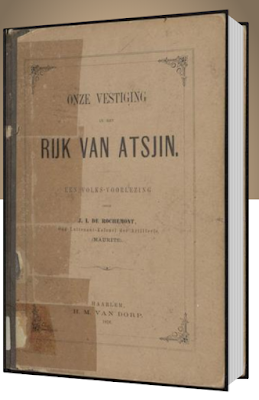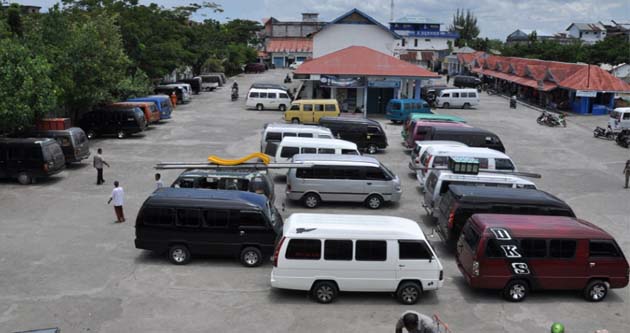OUR ESTABLISHMENT IN THE ATSJIN (Aceh/Achin/Acheh/اچيه) RICH - PREFACE
 The history of our present-day Fatherland actually starts with the Union of Utrecht, when the foundation was laid, on which two years later, in 1581, the Republic of the United Netherlands was built. Before that time, we were separate Tribes, Regions, or States, whose interests were not always the same, which were often hostile to each other, and whose independence was dissolved in the sovereign will of foreign Monarchs.
The history of our present-day Fatherland actually starts with the Union of Utrecht, when the foundation was laid, on which two years later, in 1581, the Republic of the United Netherlands was built. Before that time, we were separate Tribes, Regions, or States, whose interests were not always the same, which were often hostile to each other, and whose independence was dissolved in the sovereign will of foreign Monarchs.Our Commonwealth began its existence under the most severe circumstances. His birth bore the signs of a hasty and grievous death. But soon it was different! The world saw in astonishment how quickly we grew into a free, righteous state. In less than a century, after we had shed the yoke of strange subordination, our fathers praised at a time when we humbled Spain when we defeated England, when we pushed back France's excellent armies beyond our outstretched borders, and when we Europe were honored as a referee in major popular disputes.
Countrymen! our ancestors have been poor and miserable, but they have managed to make themselves rich and great. And they have not ennobled, helped or supported this glorious giant work by others. No, they have done this alone, with their own means, with their own powers, in spite of fearsome enemies, in spite of mighty enemies. They, when enjoying so much prosperity, owed gratitude only to Providence, who blessed their labor with the most beautiful fruits ever harvested by wisdom, perseverance, and patriotism. Among the material means with which our ancestors were able to provide so much advantage and respect, we belong in the first place to those which were supplied by our East Indian possessions. We know that the rich products of East India, up to the 16th century, were transferred to Europe exclusively through the intervention of the Arabs. Venice was then the large depot of animal products, which were mainly collected by Dutch ships, and spread over our continent. But since the Portuguese Vasco de Gama, his voyages of discovery, east of the Cape of Good Hope, had continued as far as India, the direct trade on the East, rather, became entirely in the hands of his compatriots. The great world market was now being moved from Venice to Portugal, and our merchant fleet no longer headed for the Italian, but the Iberian coasts. Suddenly the Spanish King Philip II issued the order that the Portuguese ports would be closed for us. The newly-born Republic saw her trade, her main source of prosperity and existence, at the most serious threat. But little did the angered Monarch suspect that his measure, which was to lead to our downfall, would be of great benefit to us. We made a profit, with the example given to us by Portugal. We decided to get the treasures of the East that we needed for our wars and for our development from the soil on which they were brought forth. There formed, among us, a Society of Far, which equipped four ships, with which Cornelis de Houtman, in 1597, reached Java. And not long afterwards, in 1602, the East India Company was founded, which already 14 years later, could have a fleet of 45 Linie ships, armed with 4000 guns, and manned with 15,000 heads. Since then, the history of our Fatherland is, at last, akin to the history of our Colonies. Our Colonies have enabled us to conduct the Giants struggle against Spain, and at the same time prepare us for that greatness with which we later enforced the admiration of the world. When, in 1648, the peace of Munster brought an end to our war of freedom, we were able to take a first place in the row of European states because we had been able to form Colonial Power. The exemplary wealth and prosperity that we enjoyed from 1760 to 1770 had flowed from the mild springs, traced by our own trade in the East. In the end of the last century, with our Colonies, our Republic also fell into disrepair. At the beginning of this century, our decayed Fatherland, with its disintegrated Colonies, passed into the power of a foreign despot. And a few years later, we were reborn into a new life, which, without our Colonies, would have long been finished; for, without our Colonies, we could never have overcome the difficulties which we have since overcome. As it used to be, it is still present.
Even today, we need our Colonies for our independent peoples existence, and even now, in our Colonies, we have the certain means of obtaining wealth and greatness. Let us imagine that the Netherlands was deprived of its Colonies. How dark would our future be! For what should become of our Shipping and our Trade, the sources from which we draw so many means of subsistence? Our considerable merchant fleet would fall into insignificance. Our large warehouses would be empty. Our world market would travel to Amsterdam from Amsterdam and Rotterdam. Our main trading offices would be closed. A death silence would replace the cheerful entertainment of our buying cities. Eu where was it supposed to go with our next generation? No longer would hundreds of households be welcomed every year by their sons and daughters, who would leave for our colonies in favorable circumstances, while they could not find beer as a means of subsistence. Thousand compatriots would not only cease to create an abundance in our colonies, which our country now enjoys so much, but they would also, and on the contrary, begin to increase the existing need for work and bread in a fatal way. If the Netherlands missed its Colonies, it would see poverty, long-range roads, its limits creeping in. It would soon be impotent to satisfy the needs of its people and its state institutions. It would return to that state of its disastrous past when it invoked strange sovereignty over its provinces because it was without Colonies, and consequently without means, to maintain its independence.
But do we now imagine that the Netherlands had developed its Colonies into bloom, for which they are susceptible. How would it be different than it is now! Think only of those vast fields that lie fallow; to those numerous mines, which have been mined there; to that size advantages, which the Plant and Animal Kingdom can provide us with; to those inexhaustible sources that flow there for Art and Science. With one word: we only think of all those treasures, which are still unused, in, on, and under the ground of Insulin. And it will not be difficult for us to come to the conviction that our colonies are lacking in resources to make the Netherlands have a beautiful future.
Where your treasure is, there will also be your heart. Would the Netherlands not love his Colonies? Every attempt, no matter how weakly used, to spread light over its circumstances, can not be anything other than a welcome being to any Dutchman, who cares about his Fatherland. Therefore, Countrymen! I wish to speak again to you. The subject that I will discuss is not new. So much has already been said and written about that. But this does not stop me from calling your attention again for that. For my idea will be new, at least for many of you. May she stretch for the salvation of our Colonies, that is: for the salvation of our dear Fatherland!
Original Title : Onze vestiging in het rijk van Atsjin

Comments